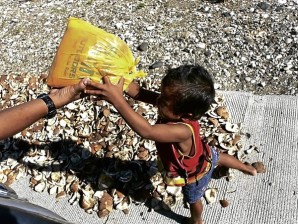Curse of politics descends on typhoon areas

A BOY pauses from his work chopping copra to reach out for a pack of relief goods in Baganga, Davao Oriental. CONTRIBUTED PHOTO
BAGANGA, Davao Oriental—From the municipal grounds, a group of women hurriedly walked to Saint Mary’s College after seeing a truck loaded with relief goods. They returned empty-handed.
“We were told that it’s not yet for distribution,” one of the women said.
What the women did not know was that 1.5 kilometers away, at the headquarters of the province’s Incident Command Post (ICP), another truck was left out in the rain, its load of rice drenched.
An Inquirer source at the ICP said the rain-drenched rice had been “resacked and distributed.”
“The rice was already smelly. I pity those who received it,” the source said.
The ICP municipal headquarters, which is the office of the Department of Public Works and Highways, is where relief goods are kept.
“The relief goods keep on arriving, but these are not being distributed. They are just left outside,” the source said, adding that there were volunteers willing to go around town to distribute “but they are still waiting for the go-signal from the province.”
Records from the central command post of the ICP in Mati City showed that a total of 73,881 prepacked relief goods had been sent to Baganga town.
The amount of goods sent to this town, based on the ICP central command records, was almost twice the number of those sent to Cateel town, which is 40,742.
But when asked how many relief packs were actually distributed to the survivors—
13,356 families, or 66,780 people, in Baganga and 10,383 families, or 51,915 individuals, in Cateel—the ICP central command didn’t have an answer.
“We’re still waiting for the reports from the ground,” said Freddie Bendulo, the ICP chief.
Bendulo would not reply to Inquirer’s query about the truck loaded with rice which was left out in the rain.
The delay in the distribution of relief goods in this town could be traced to the political rivalry between Mayor Remigio Nazareno and vice mayor Arturo Monday.
Nazareno’s son, Roy, is running to replace his last-term father against Monday, an ally of the governor, in next year’s elections.
“They want the Nazarenos out of politics,” the mayor said.
Even before Typhoon “Pablo” devastated this town, Nazareno said, Monday and his allies in the town council have been blocking his programs.
This became clear when the Sangguniang Bayan refused to approve the mayor’s disaster plan and the use of the town’s calamity funds.
Days after the typhoon, the provincial government set up its own ICP, leaving Nazareno in the dark.
“It was an insult on my part. I am the mayor, I should have led that body,” the mayor said.
Caught in the crossfire are the survivors.
The local government receives less outside help compared to the provincial government.
Nazareno said he is grateful to private groups and other local governments—Mati, Davao, Panabo and Zamboanga Sibugay—that sent help directly to his town.
In Caraga town, relief goods also pass through the provincial government. They end up in the hands of former mayor Alice Mori, an ally of the governor, instead of incumbent Mayor William Dumaan.
Gov. Corazon Malanyaon, in an interview four days after the typhoon struck, said the trying times called for unity. “This is not a time for politics,” she said.
What’s happening on the ground, however, shows the contrary, prompting nongovernment organizations and private groups to distribute goods directly to the victims.
“We just want to make sure that politics doesn’t get in the way,” said a relief volunteer.
The leader of a private relief group said his group goes straight to the victims rather than pass through the local government units (LGU).
If the goods pass through the LGU, the relief leader said, “they don’t reach the people.”
In Cateel town, the Department of Social Welfare and Development (DSWD) and private groups, not the local government, are in the forefront of the relief distribution.
“The LGU here is not functioning,” a DSWD worker, who asked not to be named, told the Inquirer.
Cateel’s mayor, Camilo Nuñez, is a brother of the governor.
“They are having a hard time distributing the relief goods. But why is it that during election campaigns, even the farthest barangays get rice ration?” a resident said. The governor, Malanyaon, is seeking reelection unopposed in May. Nico Alconaba, Inquirer Mindanao














